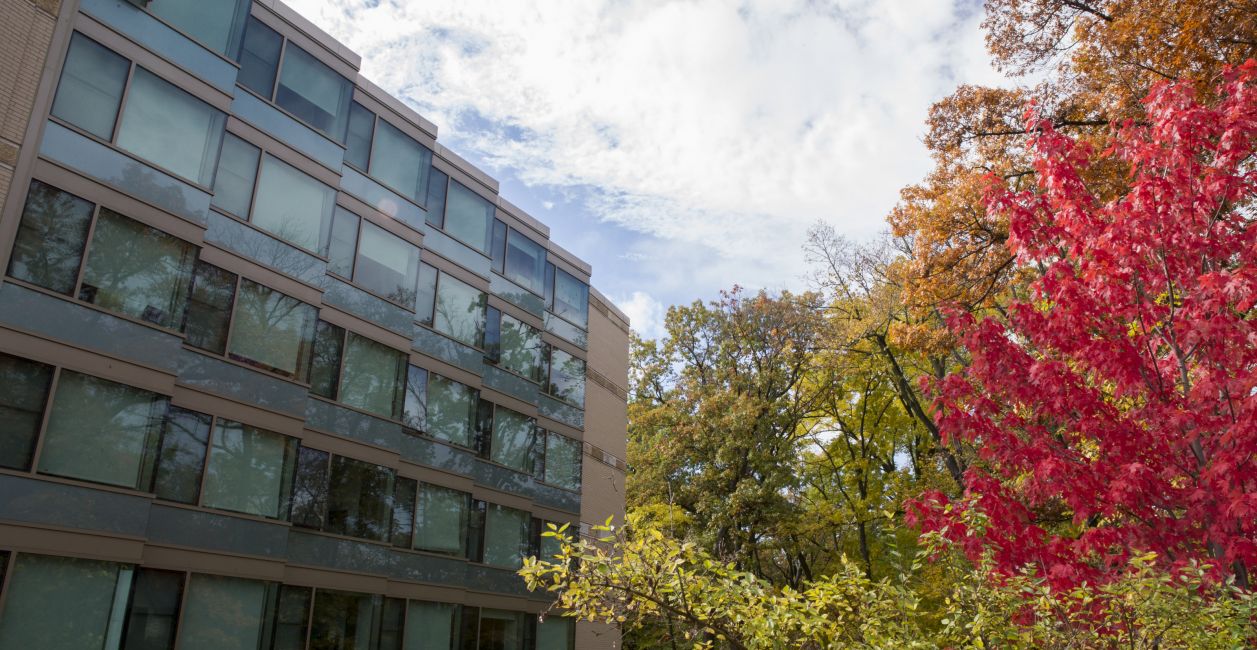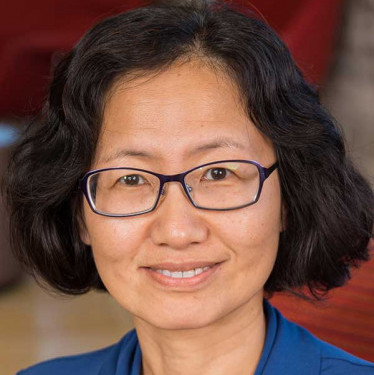
Yan Wang

Yan Wang
- Professor of Modern Languages and Asian Studies
Yan Wang joined the Carthage faculty in 2008. Currently, she is a full professor in the Department of Modern Languages and Asian Studies Program.
Professor Wang received a Ph.D. in Japanese Linguistics and a master’s degree in Chinese Linguistics from the University of Wisconsin-Madison. She also holds a master’s degree in Japanese Culture from Beijing Center for Japanese Studies and studied anthropology at the University of Tokyo, Japan.
Professor Wang’s research interests include Japanese and Chinese social linguistics, pragmatics, Japanese pedagogy, and cultural anthropology. Her recent publications have been focused on sentence-final particles and epistemic markers in Japanese and Chinese conversations. Her article” From subjectivity to intersubjectivity - A functional study of the Japanese epistemic marker-Kamo” was published in the book Recent Advances in Japanese Grammar and Discourse and “A discourse-pragmatic functional study of Chinese epistemic markers haoxiang ‘seem’ and keneng ‘probably’ is published in International Journal of Chinese Linguistics (IJChl). She also integrates non-native speakers’ data in her research and explores language teaching strategies from a socio-cultural approach. In addition, she has mentored several students’ SURE (Summer Undergraduate Research) projects on Japanese linguistics, whose works were presented at conferences such as National Conferences on Undergraduate Research (NCUR).
As a director of the Japanese program at Carthage, Professor Wang successfully established and developed a thriving and high-achieving Japanese program, which has been holding the Annual Carthage Japanese Cultural Festival since 2009. In 2017, Prof. Wang led 25 Carthage students on a “Kakehashi” learning trip to Japan that was fully funded by the Japanese government. Under her support, many Carthage Japanese students earned scholarships including Japanese Government (MEXT) Scholarships, and received job offers from the Japan and Exchange Teaching (JET) Program.
Prof. Wang is also active in the Asian Studies program, offering courses on Asian films, Chinese calligraphy, Chinese and Japanese culture through language, etc.
- Ph.D. — Japanese linguistics, University of Wisconsin-Madison
- M.A. — Chinese linguistics, University of Wisconsin-Madison
- M.A. — Japanese culture, Beijing Center for Japanese Studies
- B.A. — Japanese, Beijing Foreign Studies University
- JPN 3010, 3020: Intermediate Japanse
- JPN 4070: Advanced Japanese
- JPN 4010: Japanese Senior Seminar
- CHN/JPN 2070 Chinese and Japanese Culture through Caligraphy
- CHN/JPN 3070: Chinese and Japanese Culture through Languages
- MLA 2440: Chinese and Japanese Culture through Films
- MLA/GEO 200A: Contemporary Issues in China and Japan through Critical Examination of American Media
Japanese/Chinese social linguistics, discourse analysis, pragmatics, pedagogy and second language acquisition. Japanese/Chinese social linguistics, discourse analysis, pragmatics, pedagogy, second language acquisition and cultural anthropology.
- Mentor for SURE (Summer Undergraduate Research Experiences) grant, (Carthage), 2022
- Mentor for SURE (Summer Undergraduate Research Experiences) grant, (Carthage), 2021
- Mentor for SURE (Summer Undergraduate Research Experiences) grant, (Carthage), 2020
- Japanese Language Learners Event Grant, (Japan Foundation, Los Angeles), 2020
- Grants from Kakehashi Project offered by the Ministry of Foreign Affairs of Japan, which fully funded 25 Carthage participants to a 10-days of learning trip to Japan in January 2017.
- Japanese Language Learners Event Grant (Japan Foundation), 2015
- Faculty Research and Development Grant, (Carthage), 2012
- Top Four Paper of the 95th National Communicative Association (NCA) Language and Social Interaction Division, 2009
- Top Student Paper of the 90th National Communicative Association (NCA) Language and Social Interaction Division, 2005
- Japanese Ministry of Education (Monbushoo) Scholarship, (University of Tokyo), 1999.
- Outstanding Teaching Award, (Beijing Foreign Studies University), 1998.
- Excellent Youth Teacher, (Beijing Foreign Studies University), 1997.
- Outstanding Dissertation, (The Japanese Research Center of Beijing), 1996.
- Research Award from the Japan Foundation, (Tokyo Woman’s Christian University), 1995.
- 2018— Chapter 7 “ From subjectivity to intersubjectivity – A functional study of the Japanese epistemic marker-kamo”, Mutsuko Endo Hudson, Yoshiko Matsumoto, Junko Mori (ed.) Advances in Pragmatics Research on Japanese, John Benjamins. Pp.173-197
- 2017– Revisiting Student-generated Video Projects in Japanese Language Teaching: A Sociocultural Approach. In Proceeding of the SEATJ (Southeast Association of Teachers of Japanese) 2017 Conference.
- 2017— Intersubjectivity in Chinese and Japanese Yes-no Questions, in Intercultural Communication Studies , ICS XXVI(1), Pp.133-150
- 2014 — Coauthor with Risa Wada, “A discourse analysis of Japanese invitational strategies and expressions: the difference between Japanese Native and Non-Native speakers.” Proceeding of the SEATJ (Southeast Association of Teachers of Japanese) 2014 Conference.
- 2012 — When and why to add to iu: A study of the complementizer to iu in Japanese noun-modifications, The 2012 HUIC –Hawaii University International Conference on Arts and Humanities Proceedings. (ISSN 2162-917X)
- 2011 — A Discourse-pragmatic Functional Study of The Discourse Markers — Japanese ano and Chinese nage, Intercultural Communication Studies, 2011 Vol XX:2
- 2009 — A Dispreferred Action in a Preferred Turn Shape? — A study of “toiuka” in Japanese conversations” NCA (National Communication Association) 95th Annual Convention.
- 2009 — A Cross-linguistic Study of Yes-no Questions in Japanese and Chinese Conversational Discourse, University of Wisconsin-Madison (Dissertation)
- 2007 — Co-author with Maki Shimotani. Kaiwa ni okeru syuujosi ‘ka’ no umunit suite (The Occurrences and Non-Occurrences of the Question Marker ka In Japanese Conversational Discourse). Gengogaku to Nihongo Kyooiku (Linguistics and Japanese Education). Kuroshio Press,17-119
- 2007 — A Functional Study of the Final Particle mono in Japanese Conversational Discourse. Journal of Japanese Linguistics, Vol 2. No. 1., Linguistics Journal Press, 162-183
- 2005 — A Functional Study of Japanese Discourse Marker — ano.Annual Southeastern Association of Teachers of Japanese (SEATJ) 2005 Proceedings
- 1998 — The Symbolic Meaning of Japanese and Chinese Qixi Festival. Hakusan Review of Anthropology 5:89-108. Toyo University, Japan Press.
- 1998 — A Reconsideration of Japanese Religious Dolls. Journal of Chinese and Japanese Cultural Studies 4:22-30. Beijing Foreign Studies University, China Press
- 1998 — The Belief of Revival With Water: A Traditional Ritual in Japan. Journal of Japanese Studies 7: 325-343. Japanese Studies Center, China Press
- 1997 — On ‘Qixi’ (the Seventh Day of the Seventh Lunar Month): the Different Customs of Exorcization of an Evil Spirit by Water in China and Japan. Meikai Japanese Language Journal 3:59-69. Meikai University, Japan Press
- 2022, co-presented with Jessica Childress “Unconventional Usages of Gender-based Japanese Sentence Final Particles: A Study of wa and no in Youth Conversations” at the 29th Central Association of Teachers of Japanese Conference (CATJ 29) (virtual)
- 2022, “Grammaticalization of sugiru: the new usage as an intensifier in Japanese Youtube comments,” 2022 JLTANE Japanese Language Teachers’ Association of New England Annual Virtual Conference (virtual)
- 2022, “A comparative study of the discourse-pragmatic usages of teasing in Japanese and English conversations” at the 9th International Conference on Intercultural Pragmatics and Communication - INPRA 9 (virtual)
- 2022, “Tickling or nipping: Teasing by Japanese and English youth” at the 27th IAICS International Association for Intercultural Communication Studies (virtual)
- 2020, presented with Alex Rogers (Carthage undergraduate student) “Informational and Interactional Alignment/disalignment: A comparative study of the Japanese sentence-final particle yone with English tag-questions” at the 56th Linguistics Colloquium (virtual)
- 2020, “The Influence of Japanese learning on the students’ mental wellbeing” at the American Council on the Teaching of Foreign Languages (ACTFL) 2020 Fall Conference (virtual)
- 2020, “Is it merely a hedge? The discourse-pragmatic stance-taking functions of to omou ‘I think’ in Japanese Conversations” at the 2020 Annual Conference of American Association of Teachers of Japanese (AATJ) (virtual)
- 2019, June. “A mitigator or intensifier? –A study of non-epistemic uses of English ‘I think,’ Japanese to omou and Chinese wo juede”, Program the 16th International Pragmatics Conference, Hong kong
- 2019, March. Presented my paper “A study of the discourse-pragmatic usages of ichioo in Japanese conversations”, at the 2019 AATJ Annual Spring Conference in Denver, Colorado.
- 2018, July. “Examining the cultural complexity underlying the usages of the attitudinal adverb ichoo in Japanese conversation” presented at the 24th International Association for Intercultural Communication Studies (IAICS) 2018 in Chicago
- 2017, March. “A study of the pragmatic uses of chotto “a little” by non-native Japanese speakers: from the perspective of intersubjectivity. (AATJ), Toronto, Canada
- 2017, Feb. “Revisit students generated video projects in language teaching from socio cultural approach” (SEATJ), Murfreesboro, TN
- 2016, June, “Intersubjectivity in Chinese and Japanese Yes-no Questions”, The 22nd International Intercultural Communication Studies (IAICS) Conference, Shanghai, China
- 2016, March, co-presented with Prof. Naomi McGloin, “-No desu ka yes-no questions (YNQs) and multiple informational functions in Japanese conversational discourse.” AAJT (American Association of Japanese Teachers) Annual Conference. Seattle, WA.
- 2015, November, co-presented with Jun Wang, “Flash fiction: an integrative model in language teaching”. WAFLT (Wisconsin Association for Foreign Language Teachers) Annual Conference. Appleton, WI.
- 2015, April , “From subjectivity to intersubjectivity: A functional study of epistemic markers keneng “maybe” and haoxiang “seem”. The 27th North American Conference on Chinese Linguistics. LA
- 2014, March, co-presented with Risa Wada, “A discourse analysis of Japanese invitational strategies and expressions: the difference between Japanese Native and Non-Native speakers”. The SEATJ (Southeast Association of Teachers of Japanese) 2014 Conference. Chalotte, NC.
- 2013, March, “A Comparative Study between Japanese Sentence-final Expressions kana and kamo” The 2013 Annual Conference of Association of Teachers of Japanese (AATJ). San Diego, CA.
- 2012, March, “From objectivity to subjectivity and intersubjectivity – A functional study of the Japanese epistemic marker-kamo(shirenai)” The 2012 Annual Conference of Association of Teachers of Japanese (AATJ) Toronto, Ontario, Canada.
- 2012, January, “When and why to add to iu: A study of the complementizer to iu in Japanese noun-modifications” 2012 Hawaii University International Conferences on Arts and Humanities (HUIC), Honolulu Hawaii.
- 2010, June, “It Is Not Merely A ‘Filler’: A Functional Study of the Discourse Markers - Chinese nage and Japanese ano” The 16th International Intercultural Communication Studies (IAICS) Conference, Guangzhou, China
- 2009, November, “A Dispreferred Action in a Preferred Turn Shape” The 95th National Communicative Association (NCA), Chicago
- 2009, March, “The Functions of -no desu ka Echo Questions in Japanese Conversational Discourse” The 2009 Association of Teachers of Japanese (ATJ) Seminar, Chicago.
- 2006, March, Co-present “The Occurrences and Non-Occurrences of the Question Marker ka in Japanese Conversational Discourse” The Fifth Biennial International Conference on Practical Linguistics of Japanese (ICPLJ), San Francisco
- 2006, January, Co-present “Zero-marked Questions in Japanese Conversational Discourse” The 80th Linguistic Society of America (LSA), Albuquerque.
- 2005, November, “Co-constructing Dynamic Identities in Discourse Practice: A Study of Japanese TA Meetings” The 90th NCA Panel of Top Four Paper, Boston
- 2005, April, “The Speech Act Continuum: A Study of The Japanese Sentence- Final Particle kana” The 17th CATJ 2005 Conference, Columbus.
- 2005, March, “A Functional Study of Japanese Discourse Marker- ano”. The 21st Southeastern Association of Teachers of Japanese (SEATJ) Conference, Atlanta.
- 2005, March, “A Functional Analysis of Japanese Sentence-final Form mono” The 2005 Association of Teachers of Japanese (ATJ) Seminar. Chicago.
- 2004, December, “A Study of Japanese Sentence-final Particle kana” The 3rd Workshop of Linguistics in Wisconsin, Madison.
- 1995, August, “The Symbolic Meaning of Japanese and Chinese Qixi Festival” The 54th Workshop of Hakusan Anthropology Association, Japan
